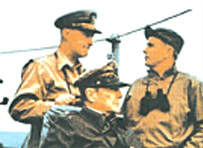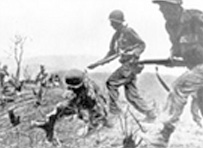
The Historical Meaning of the UN Forces Paricipation in the Korean War
In accordance with the UN decision to support Korea, 21 members of the United Nations participated in the Korean War to safeguard international peace and security under the UN flag for the first time since its foundation in 1945. Under command of the US forces, the UN forces fought battles, repeatedly moving northward or southward from the Nakdong River up to the Amnok River. The UN forces' participation in the Korean War has important meanings in the world history.
The first significance of the UN forces' participation in the Korean War lies in the fact that it was the first collective action that was taken to actualize the fundamental principle of the United Nations. In other words, the Korean War served as an opportunity to test “the principle of collective security” stipulated on the UN Charter. At that time, a total of 21 countries participated in the war. Out of these countries, 16 countries including the United States dispatched combat troops, and the other 5 countries sent medical units. About 40 member nations helped Korea with material supplies.
The meaning of the UN forces' participation in the war cannot be estimated simply by the size of troops the member nations dispatched to Korea. For the first time since the end of World War II, the UN forces' participation itself was a meaningful effort to regain peace from “peace destroyers” by collective actions of an international organization. Just in a situation when the tragedies of the World War II were still vivid in the people's memory, members of the UN nations were united to proclaim that “we have to stop at any cost the threats of peace destroyers by collective actions based on the principle stipulated on the UN Charter.”
The UN Forces saved Korea in a situation when Korea was confined within the “Busan Perimeter,” a small area in the southeast of the Korean Peninsula. At this time of critical moment, the UN forces took part in the war and changed the military situation overnight. Afterwards, the UN forces played a decisive role in driving back the communists' aggressions.
Many countries joined the UN forces in accordance with the UN resolution to help Korea. This fact provided people around the world with a good chance to think about what the communists were doing.
During the Korean War, many countries supported either South or North Korea based on their ideologies-democratic capitalism or socialist communism. So the Cold War tensions between East and West, which came into existence during World War II, were rudely shattered when North Korean troops, spearheaded by Russian-built tanks, invaded the Republic of Korea. After the Korean War, the Cold War tensions were more aggravated throughout the world.
On the other hand, Korea was devastated because of the Korean War. After the war, however, Korea was able to lay a foundation for economic development due to the assistance from the United Nations. During the war the administrative body of the Korean government was almost paralyzed, so that the ROK government had to depend on the UN Command for relief administration of the afflicted people. The UN Civil Security Command took charge of procurement of relief supplies, relief activities for refugees, and support for medical and educational facilities.

The Lessons of the UN Forces Participation
The member nations of the UN forces, except America, were all limited in the number of troops and in combat power. However, these member countries demonstrated the fact that well-trained forces can contribute a lot to the overall UN military operations by showing highly cohesive, proud, and disciplined combat capabilities.
During the course of the Korean War, the UN forces came to realize the importance of understanding languages, histories, cultures, and customs of foreign countries. In order to solve the problem of communication, they employed interpreters. Still, they had a lot of difficulties in commanding those units composed of soldiers from different countries.
The UN forces were composed of multinational nationalities with different customs and cultures. Because of the differences in religion and in eating customs, the UN forces had some difficulties in supplying food for soldiers. For instance, Turkish soldiers were Muslim, so that they didn't eat any pork. Indians believed in Hindu, so that they didn't like beef. The forces of France, Belgium and the Netherlands liked breads and potatoes, while Thai soldiers wanted rice and spicy-hot soy paste mixed with red pepper.
Those sixteen countries who formed the UN forces had different cultural and historical experiences, different eating habits, and different religious taboos. Therefore, food supply based on American or European standard dissatisfied non-American, non-European forces. These problems were gradually settled when soldiers from different countries came to understand each other. Besides, measures were also taken to respect different customs and cultures.
The UN forces also had difficulty in commanding troops because not only the situations of home countries but also the cultural and historical backgrounds of component soldiers were different from each other. It was not an easy task for a UN commander to combine different forces from different nations into combat teams and to carry out combined operations in an effective way.
Among others, some UN forces had a hard time in adapting to cold winter and rugged mountains in Korea. Tűrkiye and Greek forces adapted relatively readily to Korean environment, but Thai and Indian forces from hot countries had difficulty in adapting to the Korean weather and mountainous areas.
All of these soldiers came to Korea as members of the UN forces and safeguarded “peace and security” of Korea at the risk of their precious lives. Their distinguished services and noble sacrifices will forever be remembered in the minds and hearts of Korean people.